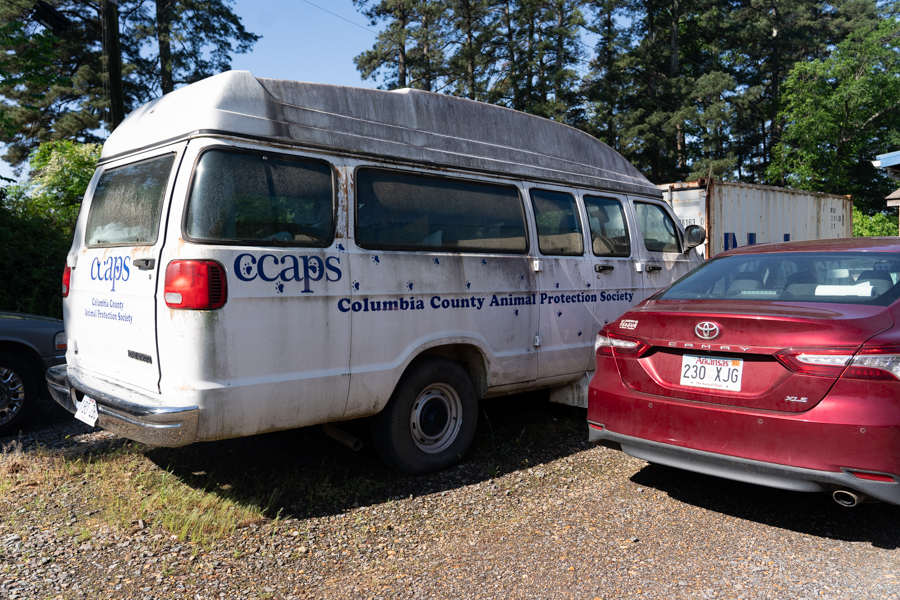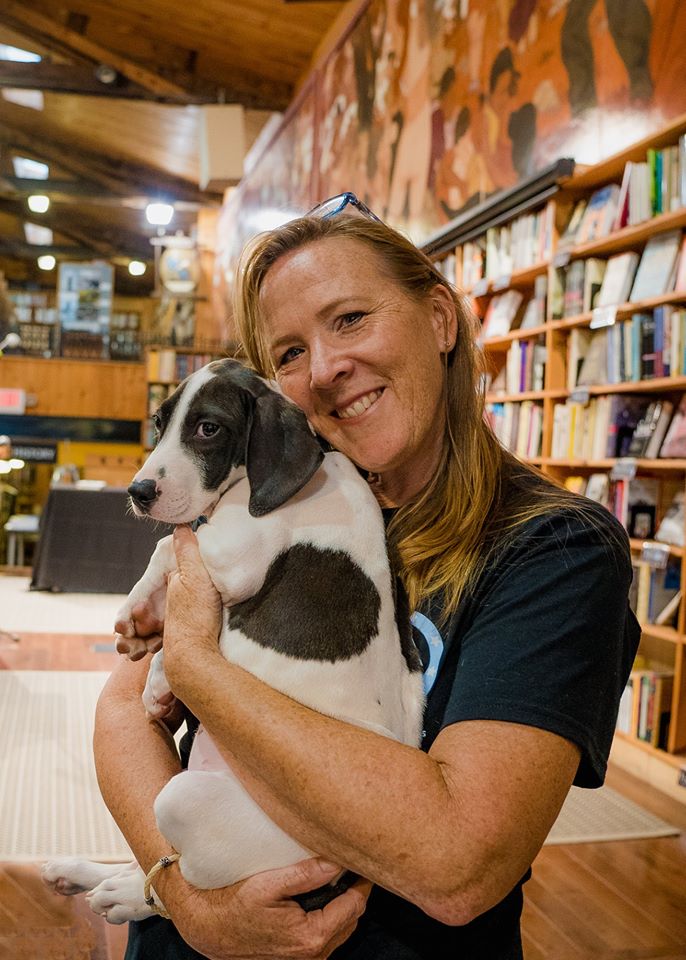Before I tell you about CCAPS – Animal Shelter, Magnolia, AR, I need to first explain something unique to Arkansas. Cities have municipal shelters funded by tax money, and county shelters do not have municipal shelters. Instead, they depend on private nonprofit shelters and rescue organizations like CCAPS (and UCAPS).
There is little regulation of these private shelters and rescues, so they can choose how they operate. Lucky for Columbia County, CCAPS chooses to operate a first-rate shelter. They vaccinate on intake, deworm, treat for flea/ticks, and give heartworm and flea/tick preventatives. They don’t adopt out a dog or cat unless it is spayed/neutered. And they do not euthanize for space, only severe behavior or medical situations.
Clistie has worked at the shelter for seven years, the last two as the shelter manager. She works tirelessly, along with three kennel techs and Terri, the floor manager, who has worked at the shelter for three years. They make sure the animals (at the time of our visit, 86 dogs and puppies, plus the cats/kittens) are cared for and find a good outcome. Clistie is a font of shelter knowledge, working with rescues, and reaching out to other shelters for ideas. She is resourceful and proactive, finding solutions rather than lamenting problems.



Much of CCAPS funding comes from the two thrift stores they operate, but the rest they have to raise. They don’t get a cent from the county or the city of Magnolia (where they are located). Magnolia, being a city, has a municipal pound where dogs are killed after their five-day stray hold.
Treating heartworm and challenging medical diagnosis (they have a dog who will need an eye removed) is a regular part of their work. Gemma, a dog who has been at the shelter since 2016, requires about $100/month in medication and is awaiting treatment for pancreatitis which will likely cost $300-$400. Finding an adopter for a dog like Gemma is unlikely, but that does not change the quality of her care.
It helps that CCAPS board vice president (and one of its founders) is a veterinarian. He is able to treat the shelter animals at a rescue rate, but their vet bill is still enormous. Preventatives alone cost them about $3000/month.
They also care for about 45-50 community animals. This reminds me of community cats programs, only these dogs aren’t feral. These dogs have owners. It’s just that their owners do not feed or care for them. So Clistie or another CCAP staff or volunteer feeds the dogs, and also treats them for fleas/ticks, gives preventatives, and deworms them.
There is no animal control officer in the county, so all CCAPS can offer the public is advice, education, and assistance. The animals they take in are found as strays or dumped at the shelter or pretty much anywhere (like the cemetery).






Last month they took in 27 dogs, but normally they only have room for about ten. When more dogs come than they have room for, they triage, taking in the most critical need. Their other options are to double up dogs, try to find a foster, or to board the dogs. Right now, they’re utilizing all of those options and struggled the week of our visit to make room for a sick mom and pups abandoned in the cemetery.
Clistie gets twenty to thirty calls a week from people wanting to surrender dogs. They do not accept owner surrenders if they are full (which is most of the time). Instead, people are put on a waiting list and given food, vet care, preventatives, whatever they need, and asked to basically foster their own dog until there is room at the shelter or a home is found.
There are a few good dog ordinances in Arkansas. There is a leash law and dogs are required to have a dog license, but these ordinances are not enforced anywhere we have visited so far.
CCAPS dogs get out via rescues and some local adoptions. The shelter is blessed to have some longstanding rescue partners, but dogs are moving slower now everywhere, including Columbia County. Some of their dogs have been at the shelter for years.
We met a beautiful large dog who reminded me of a lab/golden mix named Banjo. He grew up at the shelter. The rest of his litter was adopted, but he was still there. He was a little shy, but gentle and sweet. Not long after our visit, Banjo was adopted! I can’t tell you how excited we are when some of the long-timers find homes following our visits. We always try to showcase those long-stay dogs. While we know the shelter has done the real work, we always hope our visit helped find that home.



There were plenty of other beautiful dogs at CCAPS. We met a pair of gorgeous heelers, a funny pair of dogs with the best ears we’ve seen so far on this tour (who are also ridiculously friendly), and six beautiful labmix puppies (silver, yellow and black).


The shelter’s transport van is not drivable and sits in the driveway where they use it for storage. They desperately need a new transport van, but for now any transporting of animals has to happen with staff or volunteer’s private vehicles. A running van would give them the ability to move more animals out through rescue.

The shelter has wonderful volunteers who have helped consistently for years. They walk dogs and help with other chores. They even have groups of children who come to the shelter to help socialize puppies or play with the cats. They have a few foster families but would love to have more enabling them to help more dogs (and cats).
CCAPS does a great job doing the work that a municipal county shelter should provide. What a bargain for Columbia County. But look at this situation objectively—the county is still paying for the shelter. It’s coming out of the wallets of people shopping the thrift stores or donating to the fundraisers.
This isn’t an uncommon situation, but it’s one that frustrates me. The volunteers and staff at CCAPS should be able to spend their time focusing on giving care and saving lives. Instead, they have to split their time between that and finding ways to pay for the work they do—saving other people’s animals.



If the county enforced its dog licensing law and used that money to help fund the shelter, it would help. Animal services are critical. They should not be left on the shoulders of a nonprofit and the volunteers who support it.
There are all kinds of situations that require animal services: accidents, loose dogs, sick dogs, owners who die and leave dogs behind, people who are charged with crimes and have dogs at home, animal cruelty situations, dog-fighting, and if nothing else, it’s important to have the data on dogs in your county in the case of a pandemic involving a zoonotic virus (diseases that spread between humans and animals).
I think that every municipality will eventually come to that conclusion as they evolve as a community. I hope Columbia County will recognize the gift they have in CCAPS, count their blessings, and fund CCAPS appropriately.





Meanwhile, CCAPS operates on the very edge of what they can do. They need support and relief from the community they have been serving for thirty years.
If you’d like to help, consider donating: http://www.ccapspaws.com/store/c1/DONATIONS
Or shopping their Amazon wishlist: https://www.amazon.com/hz/wishlist/ls/H35D3YTE8XZK
Find more information about CCAPS: http://www.ccapspaws.com/
And if you live in Columbia County, step up and ask that your tax dollars (and dog licensing fees) be used to fund CCAPS.
UPDATE: Following our visit, Clistie reached out to our Instagrant coordinator requesting help in purchasing kennel gates. Ten of their gates are old and broken. They’re rigged up with extra wire to secure them. This creates challenges for volunteers, staff, and dogs to safely get in and out of the kennels. But new gates cannot be prioritized over feeding dogs and paying vet bills.
WWLDO was able to purchase five of the gates they need through our Instagrant program. The goal of Instagrants is to immediately meet a need that a shelter’s budget cannot and in so doing make saving lives easier. Here is a picture of one of the old gates and the new gate that replaced it (clearly that pup is happy with his new gate!):


They still need five more gates. Each gate is $500. We hope to help with the remaining gates. If you’d like to help, you can donate through our CCAPS Gates fundraiser, but clicking here. You can also donate to WWLDO using any of our donation platforms (or by check) and let us know it’s for ‘CCAPS gates.’ Find all our links here.

Until each one has a home,
Cara
If you want to learn more, be sure to subscribe to our email list to get the latest stories and solutions delivered to your inbox. And help us spread the word by sharing this post with others. Visit our website to learn more.
Our Annual Online Auction is coming up in September. Check out what we’ve got so far (and register to bid). If you’d like to donate an item, preferably something easy to ship (like gift cards, tickets and/or e-certificates) or something you will ship yourself, reach out. Contact Cara@wwldo.org.

You can also help raise awareness by following/commenting/sharing our content on Facebook, Instagram, YouTube, and Tik Tok.
To see our Emmy-nominated, award-winning short documentary, Amber’s Halfway Home, click here. If you’d like to see it on the big screen (along with other short dog films), check out the tour schedule of The Dog Film Festival, currently in art movie houses all over the country.

Learn more about what is happening in our southern shelters and rescues in the book, One Hundred Dogs & Counting: One Woman, Ten Thousand Miles, and a Journey Into the Heart of Shelters and Rescues (Pegasus Books, 2020). It’s the story of a challenging foster dog who inspired me to travel south to find out where all the dogs were coming from. It tells the story of how Who Will Let the Dogs Out began. Find it anywhere books are sold.
For more information on any of our projects, to talk about rescue in your neck of the woods, or partner with us, please email cara@WWLDO.org.
And for links to everything WWLDO, including volunteer application, wishlists, and donation options, check out our Linktree.



Leave a Comment
Sign up for our newsletter
Sign up to have our latest news, grant updates, shelter visits, and more delivered to your inbox.
Share this:
Like this: